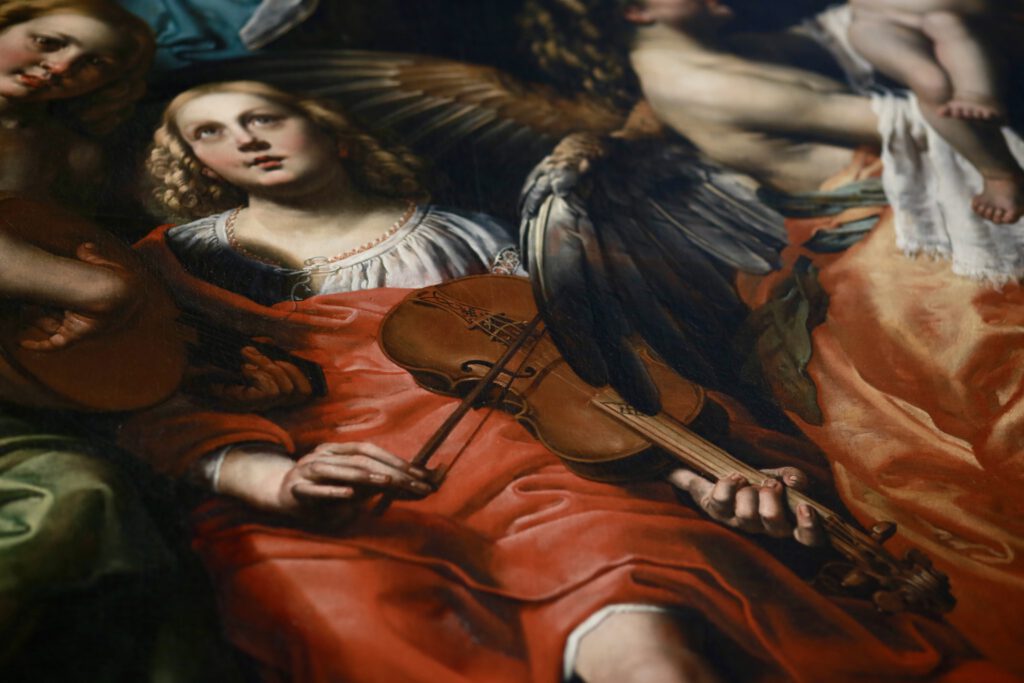Our history
Learn more about the history of early music in Brussels, and discover how deep the roots of our Department go.
Is there a long tradition of interest in "early music" at the Brussels Conservatory?
Certainly! Did you know that the "father" of this institution, François Joseph Fétis (1784-1871), pioneered "Historical Concerts" in Europe, starting in 1832? These sessions, initially held in Paris and later in Brussels, resonated with Romantic minds, revealing that the evolution of musical styles can't be simply summarized as progress. Fétis was an enthusiast, not exactly a purist; he might not have hesitated to "arrange" early works for his performers. As a leading 19th-century musicologist, Fétis was remarkably well-informed. His personal library, now at the Bibliothèque Royale, and the one he began at the Conservatoire are a must-visit for any early music connoisseur.

Our history
Learn more about the history of early music in Brussels, and discover how deep the roots of our Department go.
Is there a long tradition of interest in "early music" at the Brussels Conservatory?
Certainly! Did you know that the "father" of this institution, François Joseph Fétis (1784-1871), pioneered "Historical Concerts" in Europe, starting in 1832? These sessions, initially held in Paris and later in Brussels, resonated with Romantic minds, revealing that the evolution of musical styles can't be simply summarized as progress. Fétis was an enthusiast, not exactly a purist; he might not have hesitated to "arrange" early works for his performers. As a leading 19th-century musicologist, Fétis was remarkably well-informed. His personal library, now at the Bibliothèque Royale, and the one he began at the Conservatoire are a must-visit for any early music connoisseur.
His successor, François Auguste Gevaert (1828-1908), continued these efforts. In some famous photos, he is proudly seated at the harpsichord, an unusual sight for the time! Under his "reign," the Conservatoire amassed a prestigious collection of early instruments (now exhibited at the MIM). These meticulously restored instruments were utilized in concerts dedicated specifically to early music, starting in 1879. The performers included both teachers and students from the Conservatoire—pianists trying their hand at the harpsichord, flute virtuosos exploring the recorder, and clarinet virtuosos taking on the crumhorn in ensemble performances. For its time, this initiative was highly original and made a significant international impact. It also influenced the renowned Arnold Dolmetsch (1858-1940), one of the pioneers of period performance in England, who had studied with Vieuxtemps at the Brussels Conservatoire.
Our regions boast an exceptionally rich musical history, particularly in the 15th and 16th centuries. Interestingly, today, it is often foreign musicologists who champion this heritage. However, in the 20th century, several personalities based in Brussels made significant contributions to its study and performance. Among them was Charles Van den Borren (1874-1966), the librarian at the Conservatoire and a professor at the Université Libre de Bruxelles. Van den Borren played a pivotal role in shaping the career of Safford Cape (1906-1972), an American who, after coming to study in Brussels, shifted from composition around 1930 to establish the "Pro Musica Antiqua" group with fellow instrumentalists and singers. Renowned for their daring interpretations aligning with early music (or, as J. Stehman terms it, "young" music), the group enjoyed thirty years of touring and earned admiration from discerning musicians like Stravinsky. Thanks to LP recordings, primarily from Archiv Produktion, the audience for "Pro Musica Antiqua" expanded significantly. Until the mid-1960s, this Belgian vocal and instrumental ensemble stood as a "must" in the interpretation of music from the Middle Ages and Renaissance!
In the younger generation of the group, certain instrumentalists aspired to push their authentic approach even further. Notably, flutist Silva Devos, harpsichordist Charles Koenig, and violinist Janine Rubinlicht (who, in 1954, formed the "Alarius" ensemble with Robert Kohnen, Ch. McGuire, and later, the Kuijken brothers) played pivotal roles. Capitalizing on the interpretative freedom gained through their engagement with Renaissance music and often fueled by an interest in contemporary compositions, these musicians challenged the fortress of Baroque music, which was still guarded by a certain academicism. Following the spirit of liberation that characterized the late '60s, these libertarian aspirations gained momentum across Western Europe, the USA, and Japan. In Brussels, the teaching methods of the aforementioned musicians attracted students from various nationalities, fostering the creation of an international network.
Our regions boast an exceptionally rich musical history, particularly in the 15th and 16th centuries. Interestingly, today, it is often foreign musicologists who champion this heritage. However, in the 20th century, several personalities based in Brussels made significant contributions to its study and performance. Among them was Charles Van den Borren (1874-1966), the librarian at the Conservatoire and a professor at the Université Libre de Bruxelles. Van den Borren played a pivotal role in shaping the career of Safford Cape (1906-1972), an American who, after coming to study in Brussels, shifted from composition around 1930 to establish the "Pro Musica Antiqua" group with fellow instrumentalists and singers. Renowned for their daring interpretations aligning with early music (or, as J. Stehman terms it, "young" music), the group enjoyed thirty years of touring and earned admiration from discerning musicians like Stravinsky. Thanks to LP recordings, primarily from Archiv Produktion, the audience for "Pro Musica Antiqua" expanded significantly. Until the mid-1960s, this Belgian vocal and instrumental ensemble stood as a "must" in the interpretation of music from the Middle Ages and Renaissance!
In the younger generation of the group, certain instrumentalists aspired to push their authentic approach even further. Notably, flutist Silva Devos, harpsichordist Charles Koenig, and violinist Janine Rubinlicht (who, in 1954, formed the "Alarius" ensemble with Robert Kohnen, Ch. McGuire, and later, the Kuijken brothers) played pivotal roles. Capitalizing on the interpretative freedom gained through their engagement with Renaissance music and often fueled by an interest in contemporary compositions, these musicians challenged the fortress of Baroque music, which was still guarded by a certain academicism. Following the spirit of liberation that characterized the late '60s, these libertarian aspirations gained momentum across Western Europe, the USA, and Japan. In Brussels, the teaching methods of the aforementioned musicians attracted students from various nationalities, fostering the creation of an international network.
